Jul
15
Two tests and two papers down; one research paper and several despedidas (good-bye parties) to go before my flight on Sunday. I can’t believe how fast my time here is coming to an end (though for better or worse, this week has been dragging on and on, probably because I’ve spent essentially all of it shut away working on these assignments).
So, by way of study break, an abbreviated list of:
Things I will miss about Chile:
– My friends.
– Public transport. Granted, the existence of such a great metro system (plus buses) here is a necessary response to the problems of mobility that a city of five million people built long before cars were invented tends to face (as opposed to, say, Norman, where walking to a grocery store (at least from my apartment) is completely infeasible), but maybe this is just another way of saying that I really enjoy city life. I’ll miss my fifteen-minute walk to school and having a grocery store three blocks away and minimarkets on every corner and taking walks to the Moneda and generally not having to rely on cars at all.
– Fresh produce. The other day, I bought two kilos (that’s 4.4 pounds) of Gala apples for 500 pesos chilenos (that’s $.95) at the feria (the farmer’s market set up in the street two blocks away from my house every Thursday and Sunday). Last Sunday, I bought three kilos of mandarin oranges (excessive? definitely not) for 1000 pesos. How will I ever re-adjust to US prices?
– Speaking Spanish! You can’t speak Spanish in the US (well, as a white person) without coming off as a pretentious and obnoxious show-off; I’m really going to miss it.
– Seeing the snow-capped cordillera of the Andes from my balcony.
– The public parks and museums and centro of Santiago.
Things I won’t miss:
– The lack of Indian food in this city.
– Sharing the kitchen with sixty other people.
– The pollution.
– Doing assignments and reading dry history texts in Spanish.
– The lack of central heating at my residencia.
So, on balance? I don’t know. I don’t feel ready to come home at all!
Jul
9
So, a few weeks late (this blog is really great for productive procrastination, and with the end of the semester next week, I’m in high put-off-my-final-papers gear for the next few days): Bolivia me encantó. (lit. I loved it; also, it enchanted me.) The country treated us terribly; it’s a really difficult place to travel in, and not very hospitable to US citisens in general (luckily I was the only one in my group of friends, and was travelling with South Americans, which made things like border crossing a little easier), but nevertheless I loved it, and can’t wait to go back.
In fact, saying that Bolivia is a difficult country to travel in might be an understatement. Granted, before going we had heard horror stories from other friends and traveller acquaintances about Bolivian bus drivers (drunks) and highways (precarious, bumpy, and winding around cliffs without guardrails); I don’t doubt their stories, but I can attest that we didn’t run into any of those problems.
And although I didn’t see a single paved road (well, except in the touristy center of the town of Uyuni) until we got north of Oururo (about four hours south of La Paz), the gravel roads were in very good condition; even the ATV paths we took to get from northern Chile to Uyuni (about a nine-hour drive) were perfectly comfortable to drive on. (Though we did get a flat tire on the way.)
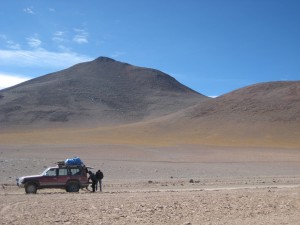
To me there was a very weird dynamic, actually, driving through southern Bolivia. In the midst of the empty countryside and strikingly impoverished little towns (groups of mud-brick buildings, really) and strikingly beautiful landscapes and waiting at llama crossings and more striking poverty (crumbling houses without roofs and solitary men out tending llamas in the middle of more completely empty land — 70% of the country’s population is rural, and the majority of people lack heating, electricity, and sometimes even running water) and so on,
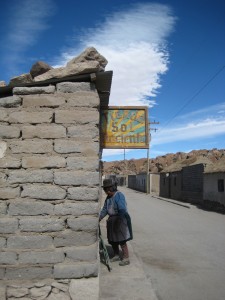
there were telephone lines everywhere, and the occasional industrial field with a foreign company on site and, oddly, road signs pointing us toward “pueblos auténticos” (“authentic towns”), a government-sponsored tourism project which had the paradoxical effect of suddenly making these pueblos seem very inauthentic (which I’m sure is not the case). (A quick internet search suggests that this guy designed the logo.) In other words, modernity and the state are staking their claims all over the countryside, but it hasn’t visibly affected the daily lives of the people (yet).
Anyway, I made the claim a few paragraphs ago that travel is difficult in Bolivia, and I should probably explain myself. Here’s the story: to save time and experience more of the country, we took an overnight bus from Uyuni to La Paz, about a nine-hour trip. We left at 9 pm. The bus came to a stop at 12 pm… and when we woke up the next morning, it still hadn’t moved. After an hour or so of continued confusion, the word slowly spread that we were in front of a bridge which had been taken over by striking peasants protesting something about land rights and waiting for the governor of the province to arrive to negotiate. They’d placed rocks all across the bridge to prevent traffic from passing.
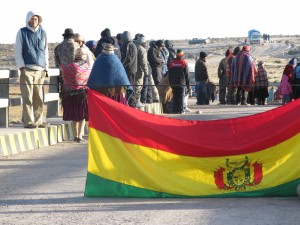
Long story short, after several more hours of waiting and getting all sorts of conflicting information (and translating for a group of British women who didn’t even have the advantage of speaking Spanish) and going to eat breakfast (galletas, a very useful word for anything small and cookie-shaped, be it cookie or cracker; a packet of Bolivian-made galletas generally cost one Boliviano — about fourteen cents), our group gave up and started walking. And walking.
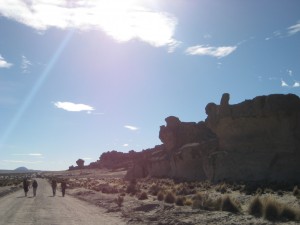
And two hours and a few kilometers later, we reached the second paro (strike), where we found a very nice man who drove us to a nearby town (at that point, anywhere was fine); from that town, another driver very kindly took us to La Paz for about five dollars apiece. Twenty-seven hours later, our ordeal was over.
But here’s what I got out of this, besides the experience (adventure) of spending a night in what one friend termed the bus de pesadillas (bus of nightmares), and then that terrible trek across the empty countryside (word to the wise: packing fourteen kilos of clothes is almost certainly unnecessary if you have to carry it in a backpack): the state of Bolivia’s infrastructure is shocking. The reason we spent so long waiting and waiting and hoping that the negotiations would conclude, rather than just going around the bridge, is that there literally is no other road between Uyuni and La Paz. Go look it up on Google Maps (we were near Río Mulatos) — there is only one highway connecting that major tourist center (and essentially the only large town in southern Bolivia) and the de facto capital of the country.
Now, for everything else that made that week personal discomfort and long nights and entirely too many galletas completely worthwhile:
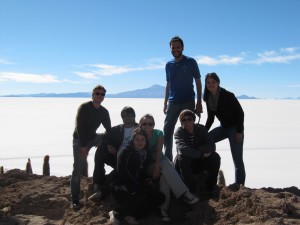
Isla Incahuasi, Salar de Uyuni -- in the middle of the largest salt-flats in the world, this "island" of rock emerges, inexplicably covered in enormous cacti.
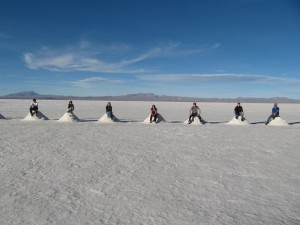
Near the Hotel de Sal, in the middle of the salar.
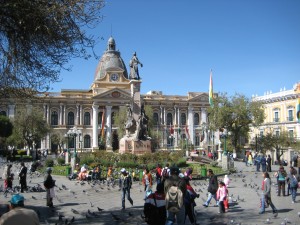
Plaza Murillo, La Paz
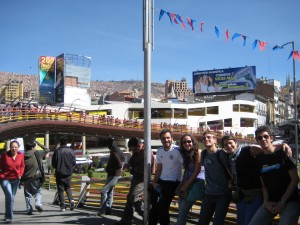
On our way to the Mercado de Hechicería (Witches' Market), La Paz.
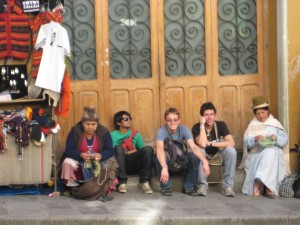
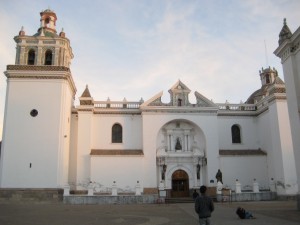
Iglesia de Copacabana, Copacabana (on the shores of Lake Titicaca) -- a major pilgrimage site during the colonial period
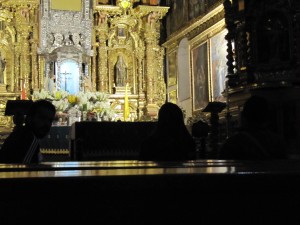
Inside the church -- that's all real silver and gold. (Photo credit: Murillo N.)
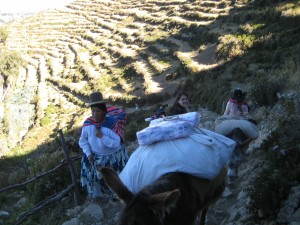
Isla del Sol, Lake Titicaca. Can you spot me?
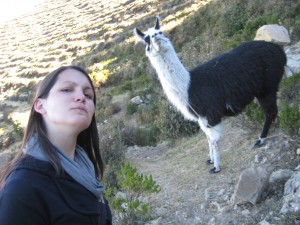
The entire time we were in Bolivia, I was already thinking: “I can’t wait to come back. Five days isn’t remotely enough.”
Y, eso. I guess more than anything, I learned what it means to fall in love with a country on this trip. I like Chile a lot, and I really feel at home now in Santiago, but it didn’t knock me out at first sight. Bolivia, though, was incredible — I loved every part of it we saw.
And the most exciting thing about Bolivia is how full of possibilities it is (sorry for the cliché). Even after centuries of being strip-mined (the famous silver mine of Potosí is located a few hours away from Uyuni) and bled dry by Europe and the US, it’s still full of natural resources (gold, silver, copper, boron, magnetite, lithium, salt, and more) just waiting to be extracted; in such a poor country, this wealth of resources could be instrumental now in driving the country’s economic development.
Bolivia is also a deeply traditional country, especially outside of the cities, and more than 80% of the population claims indigenous identity; currently, Evo Morales, the country’s first indigenous president, is leading a push for political reform to better incorporate the Quechua, Aymara, Guaraní and some 33 other recognised indigenous groups into the, the state. A constitutional reform was passed in 2009 that changed the República de Bolivia into the Estado Plurinacional de Bolivia (and made more substantive and less cosmetic changes as well!), and Morales is now looking to reform the legal system to better protect indigenous rights. This program of political and social reform gets very little press in the US, but it’s one of the most interesting things going on in Latin America right now; Morales’ attempt to integrate such diverse cultures into the functioning of the state is the first of its kind, and his successes and failures in this program will have profound lessons for the rest of the continent.
(A few of my friends casually bumped into Evo as they were out picking up our laundry one evening in La Paz):
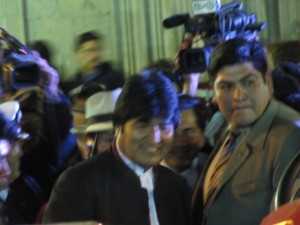
In other news, my flight home is on July 18; I can’t believe everything is coming to an end so quickly. I promise I’ll be back soon with more thoughts about Chile!
Jun
15
I mean, I can’t obviously give you THE answer. But I can talk about me!
I traveled in my first few weeks here for a weekend to Viña del Mar and Valparaíso. They’re two towns located on the coast, about 1.5 hours from Santiago; the bus ride between them takes about ten minutes. [OU also has an exchange program with the Universidad de Viña del Mar.]
This is Viña:
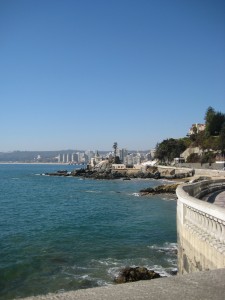
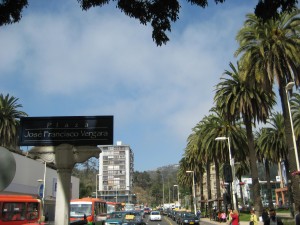
It’s a resort town, founded in the late 1800s by Santiago elites who wanted a summertime beach getaway.
This is Valpo:
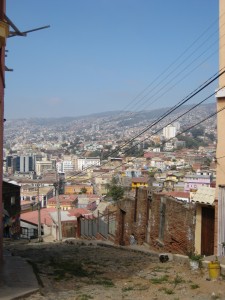
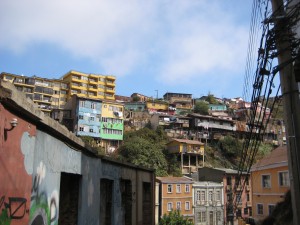
.
.
.
.
.
.
.
.
It’s a port town, historically economically critical and culturally vibrant.
.
Honestly, I didn’t like Viña very much. As far as I’m concerned, it was just like any other resort town (in any country): there are restaurants, and casinos, and big hotels, and artesanal/souvenir shops, and a beach (and a Museo de Arte Precolombino that we didn’t go to). It was fun and definitely nice to spend a day at the beach while it was still summer, but there was nothing distinctive about the town for me. Also, it’s probably relevant that casinos and big hotels aren’t really my preferred choice for spending money to entertain myself in the first place.
Valparaíso, though, I loved. The houses are all painted and hanging precariously off the city’s hills, there seem to be more stairs than sidewalks, there’s street art and murals everywhere, the port is still busy every day, and I just really enjoy spending time there. It’s different, and endlessly fascinating. I went back there on Saturday with two of my good friends from Norway, to visit Pablo Neruda’s house (La Sebastiana) and conocer (lit. meet, know, be familiar with — a very elegant little verb) more of the city. It was great.
Most of my Brasilian friends, though, hated Valpo (and really liked Viña), saying, “It’s dirty. It’s falling apart. It looks like a favela (slum). We didn’t come here to Chile to see poverty; we already know that*. We came to see richness.”
*To be clear, I’m not saying that all (or most) Brasilians are impoverished (in fact, the poverty rate has declined by about 60% in the past decade). However, the 1980s-90s were economically extremely difficult for Brasil, and the continuing enormous income inequality in the country makes poverty there much more visible than in Chile.
So, how do I/should I react to that? What does that say about what I came to South America for? There are obviously several other justifications I could provide for my preference of cities (see above), but it’s these little remarks that slap me in the face, over and over, with how often I take for granted or just plainly don’t think about the basic inequality (economic and otherwise) that separates me from most of the rest of the world. It’s horrible, and thinking about it is one of the easiest ways to ruin my day — because not only is it unfair and unjust in its own right, but it also generally ends with me feeling crushingly guilty for having so unwittingly benefited from a global economic system that I have zero control over.
Does this preference for Valparaíso then peg me as just another gringa looking to gawk at a “less-developed” country (at least stereotypically)? Is it patronizing of me just to be interested? At any rate, my desire to travel there seems to be driven by its difference from any city I’ve been to in the US, which certainly says something in itself.
And this is the part where I should write a post devoted to recognizing and elaborating and analyzing my privilege: as a United States citizen (more generally, as a “Westerner”), as a university student with a great scholarship whose parents are still paying her way, as a student with the financial and academic resources to study abroad at all, to name a few (there are many more, not the least of which is just being a white, straight girl from an upper-middle class family).
Unfortunately, because of time constraints, it’s not going to happen today.
Instead, with all this in mind and on my mind, I’m off to Bolivia!
May
29
Preliminaries: Apologies for my extended absence! I was locked out of this site for a while (my fault). Also, scratch what I said about extranjeros not actually being interested in the US’ domestic politics; trying to explain the health care debate intelligibly in Spanish is incredibly difficult (probably because it’s also difficult to make sense of in English, but that’s (sort of) a different story).
I spent four days a few weeks ago in Pumanque, a tiny town located about three hours southwest of Santiago and three hours northeast of Constitución (the epicenter of the earthquake), where about 200 engineering students and another exchange student friend and I spent four days constructing mediaguas (emergency shelters) with the organisation Un Techo Para Chile (“A Roof for Chile,” more or less like Habitat for Humanity) for victims of the terremoto. Seventeen more charter buses of USACH students went to six other towns to do the same.
The experience was a lot of fun. I met a lot of new people. I ate a lot of good food (including Gala apples right from the tree! I’d never seen an apple tree before!). I made liberal use of words learned in my Pilates class (like estirar – to stretch, as in “Stretch the measuring tape,” and hundir – to sink, as in, “Oh no, the roof está hundido!” (has a leak)) to communicate with my cuadrilla about the building process. We slept at an internado (military barracks), and I met a few eighteen- and nineteen-year-old soldiers completing their mandatory military service. We all spent a lot of time shivering (winter is coming fast).
I feel like I say this a lot, but the countryside was also beautiful. My new chileno friends tended to give me incredulous looks when I said so, but just because the region’s not Chiloé doesn’t mean it’s not lovely in its own right! Mostly though, I just really enjoyed getting to travel to another part of Chile while making myself useful at the same time, and will definitely go again if I get the chance.
I was also asked no less than four times there, “Don’t Americans speak worse English than the British?” which bothers me on multiple levels. My inner wannabe-linguistics major immediately screams, “But there’s no such thing as a “better” or “worse” language!” Then my experience here makes me remember that I definitely make an exception to that proposition where accent is concerned. There are people I live with who I still have a lot of trouble understanding after two months on account of their accents, and comprehensibility seems to me probably the only reasonable standard for “judging” a language.
And the fact that I’ve only really run into that question from Chileans has a lot to do, too, with how they relate to and think of their language. I spent a lot of time at the internado talking about the language Chileno (as distinct from Español) and its modismos (special vocabulary/idioms). Chileans are very acutely aware that they speak (self-described) “worse” Spanish than say, Peruvians or Mexicans (two nationalities known for their slower, very clear manner of speaking), both in terms of their accent, which is so difficult to understand, and the fact that they make up so many modismos, and from what I can tell their grade school English teachers have been indoctrinating them to think that you can similarly judge English dialects.
(I’ve also clearly found myself being a lot more knee-jerk defensive of my country and most things associated with it than I expected. Anyway, I stand by my position that you can’t judge Standard American against Standard British English in the same way, though I guess comparing regional accents this way would be essentially the same as comparing Spanish accents by country.)
Anyhow, those kinds of questions, as well as giving informal English lessons to my house-mates who are taking English classes, has turned me on to the differences in English dialects, too. For instance, when I look through an English textbook, I can generally tell within a few pages whether it’s written in British or American English, and not just because of the extra ‘u’s. There are more subtle differences in usage, like the use of “mustn’t” or “needn’t” instead of “shouldn’t” or “can’t,” or the fact that, “I’m mad about this blouse,” never means, “I just love this blouse,” in American English. But that’s neither here nor there; just goes to show that wherever you go and whatever you do, you’ll always end up learning most about yourself.
Hm, what else? I’m sick again! (Every two weeks, de nuevo.) Other than that, I’ve been reading reading, for Latin American Lit and because my History of Chile professor found me a few books in English!, since I have essentially zero context for the politics of Chile ca. 1920-70 (on a related note, I can’t imagine how students managed study abroad before the internet).
And today I cleaned my room, went shopping at Líder (Wal-Mart affiliate) and went with some friends to a concert/benefit featuring Chilean folkloric music and dance for Lolol, a little town affected by the earthquake. Came home to find the residence (and its residents) in total chaos since it is, after all, a Friday night. What I mean to say is, my life’s been pretty low-key lately. Not every moment is thrilling and different; routines happen everywhere. Which is not necessarily a bad thing — it just leaves me with less to blog about!
Hasta pronto!
May
12
Let’s talk for a few minutes about the place that is, after all, the reason that I’m in Santiago. Looking back, I guess I expected that it would be mostly like US campuses I’ve visited, minus the extravagant building projects, but I didn’t give the question much thought. Given that lazy preconception, I was really surprised: the school and the students are qualitatively different from their US counterparts in several ways. USACH reminds me, in almost every aspect, of what I imagine (both from movies and from the fact that in the course of my fifteen years of education alone thus far I’ve watched dramatic changes in the level of technology available in the classroom) universities in the US must have been like twenty or thirty years ago. And I mean than in the most complimentary way possible. In fact, it really is a compliment.
Most of the classrooms (certainly in the Facultad de Humanidades, or FAHU; lack of funding for the humanities seems to be a universal problem) are un-air conditioned and un-heated. Some of them are not even fully enclosed. None of them (again, in the FAHU) have installed DLP projectors or computers or video screens or even overheads. No fancy lighting, no padded desk chairs, just the class and the teacher and the white board.
The campus is too open to be described as labyrinthine, but it is huge and certainly difficult to find your way around. None of the buildings with classrooms have names or are otherwise labeled, and there’s no rhyme or reason so far as I’ve seen to the numbering of classrooms. Damned if I can find anything without asking for help.
That being said, I also think it’s beautiful. As a result of being so spread out, there are courtyards and trees and grass everywhere; as a result of the lack of indoor seating (as well as, I’m convinced, the lack of wifi), there are groups of students at all hours of the day laying out in the grass, reading on benches, eating together in the courtyards, and the concentration of students into general areas by Facultad means that you start seeing familiar faces quickly. Even though I’m not necessarily a part of it yet, there’s a strong sense of community and belonging on campus. And did I mention it’s beautiful? The way the light hits north campus in the late afternoon, the sun filtering through the trees at noon, and on clear days, you can look up and see the cordillera of the Andes in the distance.
The students also seem different, in some ways. There are, for instance, a lot more awkward engineering types, with their long hair and punk band shirts looking straight out of the ‘80s. But that’s neither here nor there; more important is that the students are extremely welcoming, and always excited to talk to and help out the exchange students (much appreciated!).
A bit of history: USACH is the former Universidad Técnica del Estado (which in turn was the former Escuela de Artes y Oficios, founded 1849). As the name suggests, it was a state-run technical university established in 1947 principally for middle- and lower-income students to become engineers and assist in the national development project of import-substitution industrialisation. It became the Universidad de Santiago de Chile in 1981. The university retains its middle-to-lower class sensibilities to this day, which something that most students and professors take a lot of pride in; they will claim that where the upper-class U Cátolica and U de Chile population spends its time pretending to be European and denying the existence of the masses beneath them, USACH reflects the “real Chile” (in terms of culture and demographics) and provides opportunities to any number of lower-class and first-generation college students every year.
The former UT has a rich institutional culture (“Somos, somos los cachorros de la U, de la U-ni-ver-si-dad (Técnica!)” is the interminable soundtrack to the first few weeks of classes as the freshmen are marched through campus as a part of the initiation into their chosen majors) and a tradition of political involvement continuing to this day, which has left its mark on the university in multiple ways. Every Friday, without fail, there are multiple carretes (parties) inside the university grounds, which start around four o’clock and go ‘til the drinks run out; then, every Monday, I walk into my early-morning ayudantia and note the new political graffiti on the walls outside the classrooms. There are also bigger, more permanent murals, and no less than five leftist student organizations (all of which were out in the Escuela de Artes y Oficios recruiting heavily at the beginning of the semester). And the university campus is completely fenced in: the Matucana entrance is closed on Fridays (presumably to control access to the carretes), and there are guards not just at the entrances but also in the gardens! And by gardens I mean landscaping, which is most large patches of grass. But they don’t seem to do much, from what I’ve seen.
More to the point, at least once every two weeks or so, students are sent running for classrooms to wait inside as demonstrating students get into altercations with the Carabineros, resulting in arrests and the launching of tear gas. I’m not really sure why the tear gas is necessary (or allowed on campus! It’s clearly a health and safety hazard to all the other students who are just trying to go to class), or why the Carabineros seem to get called every time, but I’m equally unsure about the potential usefulness of some of these demonstrations. (Does it really make sense to protest rising metro prices inside the university and then get arrested/tear gassed by police there when clearly the more logical thing to do would be to protest directly at the Transantiago offices to people who could actually change the situation, for instance?)
Today is a little bit different. I’m sitting in my room right now writing this because classes in the FAHU have been canceled due to massive student protests (manifestaciones) near Metro Baquedano. They’re protesting the recent hikes in metro fares and the price of student passes, the lack of scholarships and financial assistance for students affected by the terremoto, and the lack of representation in the national higher education decision-making process.
I’m just glad to see that students have organized a peaceful protest that will hopefully be more effective than on-campus protests, which are mostly just disruptive and inconvenient without any positive results. The disruption and inconvenience of shutting down the Plaza Italia for a few hours (in conjunction with coordinated protests across the country) and making national news for it, though — that I can support as an example of effective activism. So, more power to them! I can’t participate in protests on pain of deportation, but it’s really refreshing to see this kind of involvement and personal investment of students in the state of their higher education in Chile.
Anyhow, that’s enough editorializing from me. I do still have lots of reading to do — off to work!
May
11
— “So, what do you think of Chile?”
“Well, I like it a lot, you know? I haven’t gotten to travel enough yet, but I really like Santiago.”
I haven’t figured out how to give a more complete answer than that yet, but I’m working on it. Fortunately, this seems to suffice.
— “What do you study?”
“In the US, I study estudios internacionales, and here I’m finishing minors in Spanish and Latin American Studies.”
I generally get looks of confusion about some part of this answer, whether the question is “What in International Studies?” or “What’s a minor?” or “How can you study so many things at once?” (When you enter university in Chile, you pick one carrera and stick with a very strict course schedule for five years.) or “Oh. Latin American Studies.”
The last “question” is something I have a lot of trouble responding to, which leads me to:
— How many continents are there?
“Seven. Obviously.” Except apparently it’s not so obvious.
Ask a South American, and he or she will say, “No, it has to be one (America) or three (North, Central, and South) continents.” To which I reply, “Look at a map! The area we give the (completely appropriate) political designation “Central” to clearly belongs to the North American continent, geographically speaking; how can you possibly distinguish between Europe and Asia (as most of them do) and refuse to recognise that North and South America are geographically separate?” This line of reasoning, however, goes nowhere, and just goes to show how differently even the “facts” we learn in the second grade can be viewed, sometimes. (Poor Pluto’s fate is another good example!)
More to the point, though, I have so much difficulty with adjectives here. I’m never an “americana” but an “estadounidense” (a word that, tellingly, doesn’t exist in English, lit. “United States-ian”) — okay, that’s fair, we’re all Americans after all, and I frankly don’t like self-identifying as an American either in any language. But when to say “latinoamericano”? Is “sudamericano” (South American) ever okay? And what does it mean? Am I using it pejoratively? Why should it be perceived as pejorative? As far as I can tell, it’s just descriptive. And why should I feel bad or silently judged for having a minor in Latin American Studies? In other words, what would you rather we call it? Particularly due to the lack of an “estadounidense” equivalent in English, simply “American Studies” means something entirely different to us. I just hate feeling guilty and defensive (rightly or not) when explaining the estadounidense perspective on issues like this.
I joked to a friend in the States that I should just give up the semantics game and start identifying simply as a Texan — confirming all her worst suspicions (as a Missourian) about our pride and exceptionalism :P.
— “What’s your last name (apellido)? Y, segundo apellido?”
(In most Latin American countries (and Spain/Portugal), the first apellido is the father’s name, and the second is the mother’s — and women don’t give up their name at marriage. So, most people go by their first last name (abbreviating, for example, María Márquez M.), though it’s up to each individual which name(s) he or she wants to use.)
“Well, I don’t actually have a second last name.”
As my lit professor opined today, “It’s interesting, isn’t it, that in countries where women have so many rights and opportunities (which includes more than just English-speaking countries, it should be noted), they still give up their last names at marriage?” (Immediate response from one student: “What? But that was just in the past, right? Aren’t things are different now?”)
So, extrapolate from this what you will about the differing roles and importance of tradition and lineage and religion in these different areas of the world (or better yet, do some research, like I ought to do); it’s an interesting thought exercise.
— “Spanish is a difficult language to learn, isn’t it?”
Funny, that’s what I tend to assume about English. Spanish certainly has its pitfalls, including conjugations, agreement, and tenses galore, but all things considered, it was (is) nothing next to my current task at OU of learning Russian. And while this has a lot to do with the fact that Spanish has a lot more in common with English than Russian, I’m also positive that it’s directly related to the fact that I started learning Spanish at age twelve. Every time I remember a vocab word from the eighth grade (I pulled the word for stapler (“grapadora“) out of the air the other day, much to my surprise), or use a verb in the subjunctive without a second thought, I become more convinced of this.
— “So, America. Guns, right?” (followed by shoot-’em-up hand motions)
Yep, that’s how the conversation started. The ensuing encounter was a good example of me failing to handle myself with grace and civility and give the questioner the benefit of the doubt. The acquaintance in question is from Europe, which I failed to immediately process but gives the question a little more context, but I was mostly completely taken aback by his tone and abruptness (for goodness’ sake, we were being introduced at a party!).
So I gave an equally abrupt, annoyed, semi-coherent answer in which I explained the Second Amendment and concealed handgun laws as rationales for and examples of the rhetoric and culture surrounding guns in the US, and tried to paint the issue as not necessarily partisan (okay, that’s a bit of a stretch). I’ve given the question a lot of thought myself, and have emerged unequivocally ambivalent about it, which more than anything accounts for my combative tone and obvious irritation in answering his question. (Actually, upon re-reading, that’s ridiculous. What got under my skin was clearly the unabashed stereotyping (especially after he learned I’m from Texas) and his offensive presentation of it.) At any rate, it’s stuck with me as an example of how not to respond on behalf of myself and my country.
— “What do you think of Obama?”
“Well, I voted for him.” This is usually all the questioner wants to establish; most of them don’t actually follow American domestic politics, from what I can tell (hard to blame them, it can get pretty depressing sometimes).
(“Oh, Texas. That’s where George Bush is from, right?” generally carries the same subtext.)
Going to build houses in Region XI (still not sure exactly where) tomorrow! Wish me luck!
May
10
Here’s something I hate about city life: street harassment. In fact, hate is really not a strong enough word to describe my feelings about getting whistled at or called out to or honked at repeatedly or just stared at on the street daily (I especially detest encountering a line of cars at a stoplight, every driver pointedly staring at me as I walk past*), not to mention being persistently hassled and propositioned as I walk through the ferias (markets) by men of all ages, and I want to shout at every one of them to show some respect and leave me alone (or another two words OU would probably rather not see here).
*I spent a bit of time just now looking for synonyms for ‘stare,’ both because I used it in two successive phrases (for shame!) and because it’s not quite correct, but can’t find one. It’s hard to adequately describe what exactly these men who watch me from their cars (in particular) are doing: it’s not gaping, or eyeing, ogling, gawking, peering, or even “checking out” — it’s this strangely almost blank gaze, completely unapologetic, as if I’m not an actual person walking past on her way to school, but some mirage there for their momentary viewing pleasure. But at the same time, their stares are so concentrated, so intentional, and so entitled that it’s hard to say that they’re not cognizant of the fact that I must be feeling something (hint: it’s objectification and vulnerability with a healthy side of rage) about this unsolicited and unwanted attention.
All that said, it’s really important to point out that I have (almost) never felt physically threatened here, especially during the daylight on my usual route to school, and so on. And I know that street harassment is generally a problem in cities everywhere.
Also, harassment of the complimentary variety generally doesn’t bother me, but makes me smile (albeit in embarassment), like the guy on the street who called out to offer the galletas he was eating to my friend and me as we walked past, or even the men who walk over to me in the grocery store to whisper, “Qué hermosa eres” (and nothing else). Which is, I guess, to say that the ones who make the effort to verbalize their thoughts about my presence in a positive, non-threatening, almost respectful way.
As a direct result, headphones have become my first line of defense against a lot of this harassment, especially when I’m out on my own walking along Matucana to and from the university or shopping, and it bothers me a lot. I don’t want to disconnect from what’s going on on the street and duck my head and hurry away from anyone who looks at me — but the only people I look at, much less make eye contact with anymore on the street are women and little kids. And I will never get used to it, never just chalk it up to “culture,” and never be okay with it. So you tell me, who’s right here?
—
I was talking to a friend at home about the above entry earlier, and told her that I couldn’t post it until I came up with something positive to balance it out. So here goes:
I spent a good portion of last week agonizing over worries that I’m not where I want to be (in almost every respect) and not fully maximizing the opportunities at hand: Where should I go on feriado in a few weeks? (And why did I waste so much time before school started?) Should I have taken different courses this semester? Why am I not already more involved on campus? Should I move out of my residencia to a house where I can cook in peace? Wouldn’t I really rather be in Buenos Aires? but I’ve finally snapped out of all that a bit.
My neighborhood is beautiful. It’s easy to miss (or mistake); Barrio Yungay is in one of the poorer areas of the city, full of terremoto-damaged and abandoned houses, graffiti, litter, and a general grunginess that you’d never see east of (“más arriba de“) the Baquedano metro station. But these old houses have charm and dignity, too, the streets are lively (especially on market days) and the way the light hits the houses and the trees in fall colors at almost any hour of the day is just gorgeous. Walking to and from school, taking side streets to avoid the noise and harassment (and for a better view!), is one of my favorite parts of my day.
I went to a Banda Conmoción concert Saturday night on a whim — I asked everyone else going, “Qué tipo de música es?” and no one could give me a good answer, or even an answer at all. Instead, I got lots of futile hand motions, and, “Well, you know, it’s a mix of, it’s just really good! Come with us!” and I’m so glad I did. I couldn’t tell you what kind of music it is either, except that it involves about twenty performers, including several trumpets, saxes, clarinets, drums, trombones and a sousaphone (as well as a dancer and a man who leapt around the stage in a demon costume), seems to borrow some from Chilean folkloric music (cumbia?), has super-catchy lyrics, and can keep a crowd of several hundred dancing (and jumping and occasionally crashing into each other) until five in the morning. In other words, it was great fun, and was really a step outside the norm for me.
One thing I learned quickly upon arrival is that probably the biggest part of any travel experience is the people you meet along the way, and I’ve had the privilege already of meeting some great friends from all over the world. I don’t want to wax poetic for too long here, except to say that I’ve found some of the most welcoming, generous, kind people here (at my residence and the university) that I’ve ever met, and it’s really made my experience so far.
When I arrive back at the Quinta Normal metro station, whether from a weekend trip out of the city or even just a long day across town, I’ve started to think, “Home again at last.” And that’s about as much as I can ask for for these few months, really.
In other news, I’m going (I’m almost positive) to the south this week to help build houses with USACH! Updates to come!
May
3
Reading through Bobbi’s recent posts got me thinking about what exactly those words mean for me; to tell the truth, I’m still not sure. It’s probably easier to start here by talking about homesickness, which is something I get asked about a lot.
Honestly, I really don’t feel homesick. I don’t spend my time wondering what’s going on in the US and wishing I were there (and anyhow, friends and family are only a facebook chat or skype call away these days). My take on the issue is, I have a plane ticket booked for July. I’m going home then without question, and truly I’m more worried about not having the time to fully enjoy my time in South America than about what’s going on there. Though I can’t define it very well, homesick is not what I feel.
Culture shock, however, strikes me as a much more nebulous question. It’s another thing I get asked about a lot,* and I generally have a lot of trouble answering. There are a number of ways to approach the issue. For one, most extranjeros I know are equally struck by the fact that people and personalities are a lot more individually variable, and a lot more constant across cultures and nationalities, than any overriding “national” characteristics.
*and unfortunately, the question usually comes couched in unflattering, self-deprecating terms: “So, what are your impressions of Chile/South America/el tercer mundo? Underdeveloped?” (The Spanish term is subdesarrollado, which somehow strikes me as much more pejorative than the English.) This is a pretty uncomfortable discussion to get into, as is trying to explain that we don’t use terms like Third World anymore: “less developed countries” and the even more recent “Global South” are the post-Cold War euphemisms of choice — which in any event doesn’t change the political and economic reality we’re talking about.
On the other hand, I could run through a litany of little differences and quirks of life I’ve run into here, like the fact that all the food that comes in jars or bottles or cans in the US (e.g. jams and jellies, mayonnaise and all other condiments, olives, spices, sauces (especially tomato), hot sauce, salt, cheap hand soap and shampoos, etc) comes in little plastic bags here, which tends to be inconvenient, messy, space-saving and far less wasteful.
– Or the fact that there are no trash cans on the streets in my neighborhood.
– Or that students aren’t allowed into the stacks of the university’s libraries, but have to ask at the desk for the specific books they need.
– Or that on nutrition labels, listing sugar content doesn’t seem to be mandatory, but artificial sweeteners must be listed in bold print with an accompanying table showing sweetener content per portion alongside the RDA per kilo of body weight (an interesting reversal of national preoccupations?).
– Or that everyone smokes, even indoors.
– Or that all football (i.e. soccer) matches require careful pat-down and bag searches to enter the stadium, heavy police presence (complete with bulletproof shields!), and razor wire and electrified fences between the fans of opposing teams. All that said, football games are really fun; there’s a lot of active participation, the singing and chanting of the fans never stops, and the players are very theatrical on the field. For lack of a better word, it’s almost like a… game for them.
– Or that public restrooms are hard to find, often require payment and don’t necessarily promise toilet paper, toilet seats, or hand soap.
– Or that USACH only has a few wi-fi hotspots so far — which means that students spend a lot less time on their computers and more time talking to each other.
– Or that produce and bread are sold by the kilo (well, go figure) so what looks comparable to US prices is actually much cheaper, a pleasant surprise.
– Or that almost nobody places their phones on silent/vibrate. My tentative theory is that an audibly ringing phone makes the necessity for the person to extract him- or herself from a conversation clear and immediate to both parties, and thus more excusable. Which is more polite, in a counter-intuitive sort of way.
– Or that the Chileans I’ve run into who speak English have tended to speak British English, which seems noteworthy to me only because of my lazy preconceptions about the ubiquity of American English, I know.
I could go on, but these are, like I said, little things. I didn’t stop short, close my eyes and start whispering “There’s no place like home” upon encountering any of them, or even the sum of them. There are only a few things on that list that really bother me, and overall (and this is maybe the most salient point of the discussion when talking to Latin Americans) my standard of living in this country is just not markedly different from home. But the point is that I didn’t come here expecting just another American city (though the richer neighborhoods of Santiago can definitely feel that way) — I came here to experience these differences.
So what is culture shock, then? Maybe I can answer this way: the only thing that I’ve had real, significant trouble adjusting to here is my lack of Spanish comprehension, both in class and in conversation. I wrote the following up a few weeks ago, and though things have been rapidly improving since then (my reading comprehension in particular is getting exponentially better), this still describes my day-to-day experience, more or less:
Instead of hearing and instantly understanding (in terms of deciphering the accent and knowing what the words mean) and being able to hold several paragraphs of a professor’s lecture or even just a text in my head at once, being able to assimilate it into whatever pre-existing knowledge I had about the subject and think about possible ramifications of/applications of/problems with or counter-arguments to/further questions about/possible biases in/extensions of the information presented and being able to formulate a clear and coherent response to it in less than thirty seconds or so, I’m struggling with just the first two; even holding contiguous paragraphs of a lecture in my mind to give context to whatever stream of words is coming at me next is a challenge sometimes.
I hate it. It’s so difficult just to pay attention; there’s no such thing as passive listening for me in Spanish yet, because if I sit back and try to just absorb and understand a few paragraphs before writing it down, I usually end up with vague impressions, fleeting images or “feelings” about what I just heard, and few if any concrete, repeatable (or write down-able) and explainable facts, and then suddenly I’m missing what he says next. It’s almost like the process of remembering a dream. Probably the most difficult thing to do is to write something down while simultaneously listening to whatever is coming next (though it’s easier to write in English and listen in Spanish sometimes, presumably because I’m legitimately comprehending the content of at least one activity).
And so I’m stuck in class, taking copious notes, trying to cope with questions suddenly thrown at me, both in terms of understanding what the professor is asking me and then forming a coherent, Spanish-language response within an acceptable amount of time, and all of the real understanding comes from going back, recopying notes and starting to make sense of the words I’d earlier taken down like a dictation machine.
I don’t know whether this counts as “culture” shock per se, but it has definitely characterised my experience in Chile so far. More than anything, it’s shown me how easy it is to take something as simple as a conversation for granted. Point being, I think that being here is teaching me, if nothing else, a lot about empathy.
Apr
27
Hi everyone; I’m getting into this blogging game a little late, so let’s get right to the story so far: I’m a second-year Russian and East European Studies major at OU, currently studying at the Universidad de Santiago de Chile (or USACH) in order to finish Latin American Studies and Spanish minors.
I arrived in Santiago on March 11 (about two weeks after the earthquake), and quickly moved into El Punto, a residencia universitaria for international students. It’s essentially a big dorm with a shared kitchen, living room, and patio (though I have my own room — with a balcony!). I live with about sixty other exchange students from all over South America and Europe, principally from Brazil and Spain, and I love it.
As the only OU student in Santiago, I was extremely lucky to stumble upon such a great community of other international students to live with. I got luckier than I knew, actually, because about half of the people at El Punto are also students at USACH. This was (and is) incredibly helpful because one of the first things I discovered was that the Spanish I remember from high school is not nearly sufficient (yet, I hope) for me to be self-sufficient here. Combine that with the fact that living with other people is always more fun, and that these particular people are unbelievably welcoming and caring and helpful and have seemingly unlimited patience with my somewhat limited Spanish, and I couldn’t be happier.
After arriving all in a rush (I had to delay my flight out for a few days), I soon learned that the start of the semester had been pushed back until March 29 to accommodate students affected by the terremoto. What did I do with my two suddenly free weeks? Regrettably little. I’ve realized since then that I should have seized the opportunity to travel a bit before school started, and also before it got cold! I knew the seasons were flipped here, but I didn’t realize that it would get so chilly so fast! (“Just wait ‘til June and July,” my Chilean friends tell me. “Then it rains every day, too.”) The climate changed almost overnight, and it’s not going back — I’m no meteorologist, so don’t quote me on this, but something about being only thirty miles from the ocean (rather than hundreds, like in Oklahoma) makes the climate much less variable. On the one hand, it’s easier to plan according to the weather, but on the other there’s just no relief! Just lots of big blankets and gatherings in the living room. But I digress.
Anyhow, those two additional weeks free did give me time to explore the city with my new friends, visiting various museums (this city is full of museums), parks, markets, and one of Pablo Neruda’s three houses; we also went to Viña del Mar (where OU has another exchange program with the Universidad de Viña del Mar) and Valparaíso for a weekend. Viña is a resort town with beautiful beaches, and Valpo is a port town with beautiful houses and street art. Those two cities are just a two-hour bus ride away from Santiago; since we didn’t spend nearly enough time in Valparaíso, we’re planning a day trip back sometime soon.
This extended vacation of summer weather and no obligations past getting to know my housemates and the city had to come to an end though; I’ve been in classes for about three weeks now, taking Pre-Columbian Cultures, Latin American Literature II, History of Chile in the 20th Century, and The US and Central America (as well as Pilates and Ceramics, since all of the art and sports classes here are free and open to everyone!). Just functioning in Spanish can be difficult sometimes, not to mention learning in Spanish, but I’d like to think I’m up to the challenge. My first test is next week — I guess I’ll find out!


